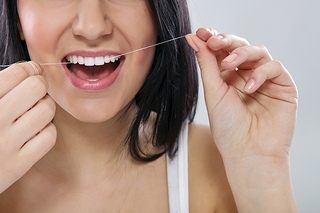Patient Question: "What are the five things I should do in between visits?"
November 11th, 2013

When it comes to keeping your smile looking its best, good oral hygiene is a must! Good oral health habits should start early and continue throughout your lifetime. Here, Dr. Michael DeWeerd and Dr. Kortni Matteson and our team at DeWeerd Dentistry suggest five habits worth adopting that will help keep your teeth healthy:
- Brush and floss regularly. Brush gently at least twice a day, paying special attention to the gum line to rid your mouth of food and bacteria that may lurk in between your teeth. Floss at least once a day. Replace your toothbrush every three to four months or sooner if the bristles are frayed.
- Make regular visits to see Dr. Michael DeWeerd and Dr. Kortni Matteson. Regular checkups (twice yearly) will help diagnose any dental problems early on when they can be more easily treated.
- Stop smoking. Did you know smokers are four times as likely as nonsmokers to develop periodontal (gum) disease? Tobacco, whether in the form of cigarettes, pipes, cigars, or chewable tobacco, increases oral and throat cancer risks, and raises the risk for candidiasis, an oral fungal infection. Smokeless tobacco contains sugar, which furthers your risk for cavities.
- Limit your alcohol intake. Heavy drinking dramatically increases the risk of developing mouth and throat cancers.
- Eat healthy. Avoid snacking on foods that contain high levels of sugar or starch. We encourage you to eat plenty of fruits and vegetables, which are known to help stimulate the flow of saliva to re-mineralize tooth surfaces and neutralize cavity-causing bacteria.
To learn more about the habits you should practice in between your visits to DeWeerd Dentistry, or to schedule an appointment, please give us a call today!










 Website Powered by Sesame 24-7™
Website Powered by Sesame 24-7™